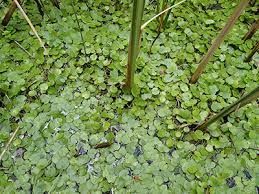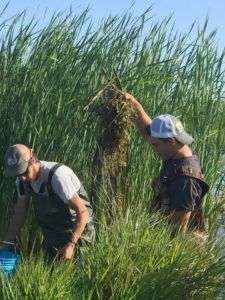MUCC Receives Funding for Aquatic Invasive Species Awareness
MUCC is happy to announce that they are one of seven projects that received funding to educate boaters, paddlers, anglers and waterfowl hunters on aquatic invasive species. In partnership with the Michigan Clean Boats Clean Waters program and EGLE, through funding from a Great Lakes Restoration Initiative grant, MUCC is excited to help spread the word at events this spring and summer. MUCC will focus its efforts on European Frog-bit and the importance of not spreading the aquatic plant.

MUCC is part of an awardee class that includes lake associations, watershed groups, local units of government, and nonprofit organizations. The more than $19,000 in grant funds will be used to communicate aquatic invasive species prevention information through outreach materials and in-person events. Projects range from the installation of signage at boat launches to boat and trailer cleaning stations with invasive species removal tools.
The seven funded projects for 2021:
- The Benzie Conservation District will engage boaters through their Aquatic Invasive Species Pathways Program in Benzie, Grand Traverse, Leelanau, and Manistee counties. Staff and volunteers will conduct boat washing events at public and private launch sites throughout the boating season and are installing signage at boat access sites.
- The Black Lake Preservation Society is installing boat and trailer cleaning stations with hand removal tools at three public boat access sites on Black Lake in Presque Isle County. They will be hosting grand opening events at each access site to demonstrate how to use the equipment.
- The Lower Grand River Organization of Watersheds is hosting three outreach events with educational materials at popular public access sites along the lower Grand River in the Grand Rapids region. They are also creating a video demonstrating proper boat cleaning techniques.
- The Michigan United Conservation Clubs is sharing prevention information via the Michigan Out-of-Doors magazine and membership newsletters. They are also incorporating Clean Boats, Clean Waters prevention messaging in three of their “On the Water” volunteer watershed habitat improvement project workdays on the Clinton River and Manistee River
- The Missaukee Conservation District is partnering with the North Country Cooperative Invasive Species Management Area and the Missaukee Lake Association to host three outreach events on Lake Missaukee and Lake Cadillac. They will also be distributing educational materials at local businesses and popular tourist destinations.
- The Charter Township of Oxford is installing a user-operated, waterless cleaning station that will be equipped with a weed removal tool, plug wrench, boot brush, and interpretive signage at the Stony Lake Township Park in Oakland County. They will be promoting the cleaning station and invasive species prevention activities via media outlets and at three outreach events hosted at township parks throughout the boating season.
- The Portage Lake Watershed Forever watershed council in Manistee County is hosting aquatic invasive species education booths at community events throughout the boating season and will be applying parking lot stencils with outreach messaging at popular boating access sites. They are also partnering with local businesses including marinas and bait shops to share educational information.

Public outreach continues to be an important tool in Michigan to address invasive species issues. This year, grant funding was available for the first time through the program to support local organizations. The Michigan Clean Boats, Clean Waters program is a joint effort between Michigan State University Extension and the Michigan Department of Environment, Great Lakes and Energy . Funding for the program and this grant opportunity is provided by the Great Lakes Restoration Initiative.
Adapted from the Press release written by Paige Filice-MSUE
The post MUCC Receives Funding for Aquatic Invasive Species Awareness appeared first on Michigan United Conservation Clubs.
Recent Posts



